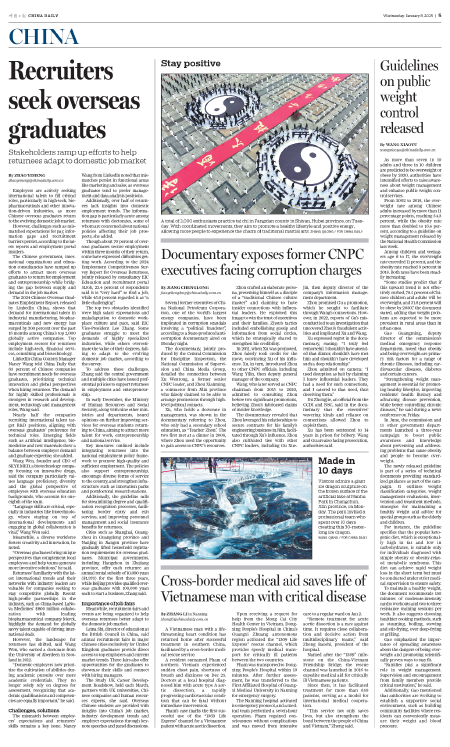As more than seven in 10 adults and three in 10 children are predicted to be overweight or obese by 2030, authorities have intensified efforts to raise awareness about weight management and enhance public weight control services.
From 2002 to 2018, the overweight rate among Chinese adults increased by more than 11 percentage points, reaching 34.3 percent, while the obesity rate more than doubled to 16.4 percent, according to a guideline on weight management released by the National Health Commission last week.
Among children and teenagers age 6 to 17, the overweight rate exceeded 11 percent, and the obesity rate reached 8 percent in 2018. Both rates have been steadily increasing.
"Some studies predict that if this upward trend is not effectively curbed, 70.5 percent of Chinese children and adults will be overweight, and 31.8 percent will be obese by 2030," the document stated, adding that weight problems are expected to be more prevalent in rural areas than in urban ones.
Gao Guangming, deputy director of the commission's medical emergency response department, noted that obesity and being overweight are primary risk factors for a range of chronic illnesses, including cardiovascular diseases, diabetes and certain cancers.
"Strengthening weight management is essential for promoting healthy lifestyles, improving residents' health literacy and advancing disease prevention, while better controlling chronic diseases," he said during a news conference on Friday.
In June, the commission and 15 other government departments launched a three-year campaign to boost public awareness and knowledge about preventing and addressing problems that cause obesity and people to become overweight.
The newly released guideline is part of a series of technical documents providing standardized guidance as part of the campaign. It outlines weight classification categories, weight management evaluations, intervention and treatment methods, strategies for maintaining a healthy weight and advice for special groups such as the elderly and children.
For instance, the guideline specifies that the popular ketogenic diet, which is exceptionally high in fat and low in carbohydrates, is suitable only for individuals diagnosed with simple obesity or obesity-related metabolic syndrome. This diet can achieve rapid weight loss in the short term but must be conducted under strict medical supervision to ensure safety.
To maintain a healthy weight, the document recommends 150 minutes of moderate-intensity cardio workouts and two to three resistance training sessions per week. It also suggests choosing healthier cooking methods, such as steaming, boiling, stewing and stir-frying, over deep-frying or grilling.
Gao emphasized the importance of spreading awareness about the dangers of being overweight and promoting scientifically proven ways to stay fit.
"Families play a significant role in weight management. Supervision and encouragement from family members provide critical motivation," he said.
Additionally, Gao mentioned that authorities are working to establish a supportive social environment, such as building community facilities where residents can conveniently measure their weight and blood pressure.
wangxiaoyu@chinadaily.com.cn

